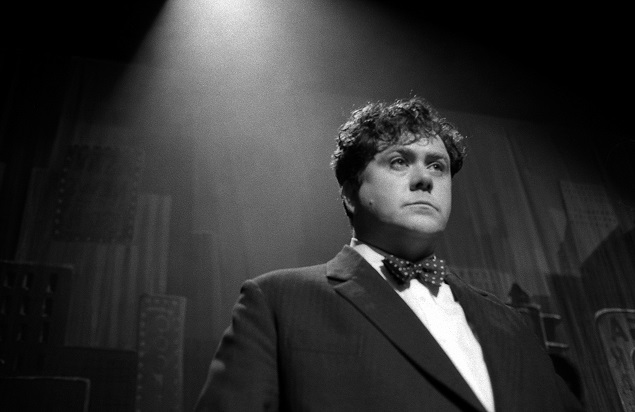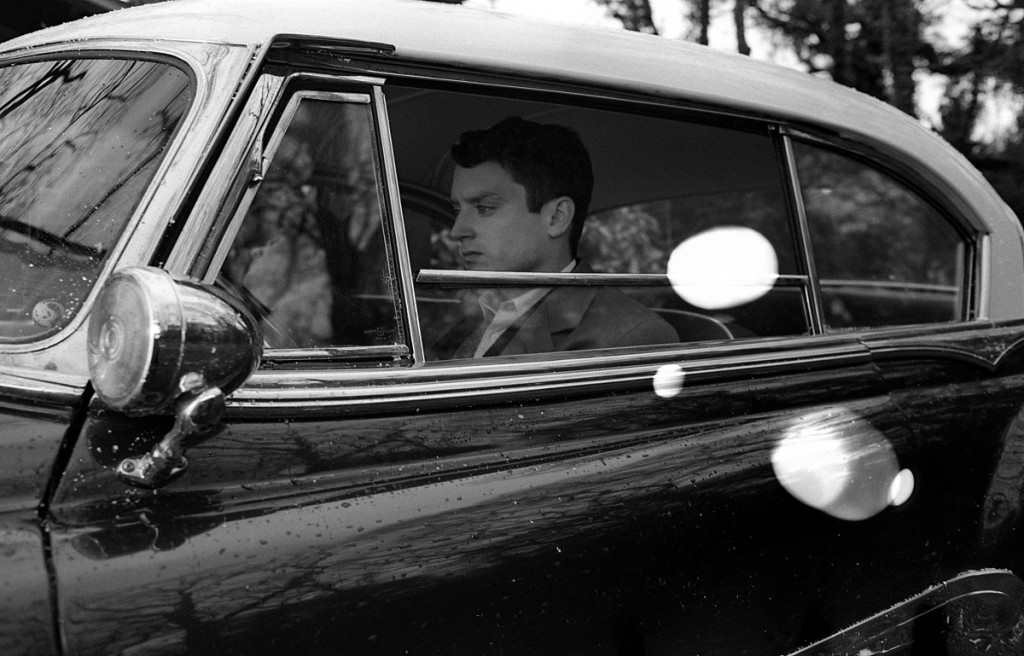Chasing Fire: Dylan Thomas Lights Up The Screen In ‘Set Fire to the Stars’

Celyn Jones in “Set Fire to the Stars.” Photo: Strand Releasing.
In 1950, when John Malcolm Brinnin — a young poetry professor at the time — set out to bring the brilliant and incendiary Welsh poet, Dylan Thomas, to American audiences, he might as well have been chasing fire. Because Thomas was not only intent on setting fire to the stars with his words, but to himself and everyone else that came within shouting distance. He was a force of nature — drunken, delirious, demanding and too oversized for the real world. It’s nothing short of a miracle that Brinnin survived.
For a debut filmmaker, it’s a big challenge to take on such a gigantic man-of-letters for a subject. The principle lead in Set Fire to the Stars, in this case actor/co-writer Celyn Jones, could easily have run away with such a tempting part. And yes, even though he is guilty of turning in a raging, histrionic performance that leaves any attempt of objective storytelling behind, director and co-writer Andy Goddard nevertheless manages to surround his central character with a pitch-perfect cast and a tantalizing script in the bargain.
Chief among the players is Elijah Wood as Brinnin, a perfect counterpart to the burly, curly-haired lion of a man that Jones has fashioned for himself. Audiences will remember Wood as Frodo Baggins in Peter Jackson’s blockbuster Lord of the Rings trilogy. Here, Wood, as the well-meaning, perfectly-manicured aesthete, is steadfast in his resolve to tame the wily beast in his charge. When Thomas is recovering from a drunken, orgiastic bout in a tubful of ice cubes, Brinnin fetches candy bars and Superman comics for his hero. At one point in the film, Thomas steps in front of the curtain to deliver a sonorous reading (after throwing up backstage), while Brinnin stands in the wings, rapt at attention. He does not yet believe himself to be in the presence of such genius.
But even heaven-sent poets have feet of clay and Thomas is no exception. He’s a big baby at best, whining to be kept entertained. If Jones wasn’t capable of delivering such a blustering, spot-on portrayal, viewers might be tempted to call it a night and leave it to history to determine whether the Welshman was really worth all this idolization. The starry-eyed Brinnin tries hopelessly to teach the poet chess; Thomas calls for a hot pastrami sandwich, which catapults our pair into an all-night deli with a waitress straight out of a typical B-rated ’50s noir movie. When Brinnin tells her his friend is from Wales, she replies, “as in whale?” Goddard’s determination to film this art house saga in stark black and white is an interesting choice. It throws his characters into high relief in a hot-house atmosphere where they can provide all the color that’s needed.
This is never better displayed than when Brinnin takes Thomas to a cabin in Fairfield County in Connecticut that had belonged to his parents. If not an attempt at a “cure,” it’s at least a temporary solution to a doctor’s change of lifestyle recommendation. It’s there that the two are confronted by Brinnin’s neighbors, Shirley (Shirley Henderson) and Stanley (Kevin Eldon) — a married couple who just happen to be writers. And these two are a pair for the books — hardcore smoking and drinking caricatures of the literati. Only Edward Albee’s George and Martha from Who’s Afraid of Virginia Woolf could hold a candle to these two. Spouting a fictional tale for the quartet, Shirley — with her myopic stare through thick-framed glasses and a little girl voice — delivers a final punch to her story, not unlike what we might expect from a Flannery O’Connor wannabe. Goaded by Thomas, Brinnin comes up with one of his own. It’s a wrenching monologue that details a gruesome “boys will be boys” recollection involving two mice, sending our delicate professor almost over the edge. Whether it really serves to move the plot along is questionable, but it does manage to reinforce Brinnin’s sensitivity and just how scar-inducing traumatic events can be in a young boy’s life.
A minor but important subplot in the course of the relationship is a letter from Thomas’ tempestuous wife, Caitlin, back home. Repeatedly, he refuses to open its contents, and it eventually becomes a Pandora’s Box. When he finally takes the correspondence into the woods to read, the apparition of his spouse appears. And what a hellion she is. There’s nothing pallid and ghostlike about the woman in his imaginings. Kelly Reilly plays her as a sexually-charged, worthy opponent for his affections, and even though this English lady lights up the screen for only a few brief moments, she holds her own as a giantess to his own Olympian ego. An actress to watch, she gave a breakout performance in After Miss Julie at the Donmar Warehouse in London, gaining her a Best Actress nomination for an Olivier Award in 2003. She also won acclaim for the award-winning film Calvary (2014).
Where the conceit of having Caitlin materialize before her delusional husband works in such a character-driven script, an extended sequence whereby each character in automaton fashion speaks a line from the poet’s repertoire seems awkwardly and unnecessarily imposed. Such surreal vignettes can often translate as artificial when played out against the real and in-depth verbal engagements the script provides.

Elijah Wood in “Set Fire to the Stars.” Photo: Strand Releasing.
What does work stylistically, as mentioned earlier, is the beautifully executed black and white cinematography, thanks to veteran director of photography Chris Seager. These visuals are set against a background of modern jazz and at times dissonant one-note piano riffs by composer Gruff Rhys. Such accompaniments serve to fit the jangled nerve-endings of Thomas’ own ups and downs.
Brinnin is forced into playing the bad cop role (finally!) when he must get Dylan to Yale for a crucial reading in front of the heads of the university. They applaud in unison at his delivery, but this is only half of it. A relapse into insults and over-the-top vulgarity (“I wish we were all hermaphrodites — then we could all go f—k ourselves”) has been percolating, and Jones delivers a dirty limerick-laden performance to send the university bigwigs running for cover. It’s not surprising that Brinnin ends up the sacrificial victim in this burlesque.
Wood’s characterization of Brinnin is in high contrast to Jones’ own rough and tumble delivery, obviously heightening the dramas unfolding throughout. But it must be noted that the intrinsic hero worship and naivety of his character — coupled with the actor’s own wide-eyed persona — brings the viewer dangerously close to dismissing him as too precious, too dandified to be completely believed.
Jack, a one-time supporter of Brinnin’s, leaves his colleague high and dry. Steven Mackintosh as a modern-day Benedict Arnold is both wily and lethal in his rejection. Calling his colleague a “sideshow huckster,” he tells him he will end up “teaching Mother Goose to Polish kids in Greenpoint.”
The former English majors in the audience will no doubt remember that Thomas did not “go gentle into that good night.” As for Brinnin, he later became known for his 1955 volume, Dylan Thomas in America, as well as for producing scholarly works on several other American writers, including Gertrude Stein, T.S. Eliot and Truman Capote, among others.
Goddard has distinguished himself primarily as a television director (Downton Abbey and Once Upon a Time). He is currently in pre-production on Patricia Highsmith’s The Blunderer for feature film audiences. He’s obviously not afraid to take on difficult, off-the-beaten-track subject matters. Besides gaining Goddard new fans, the superlative work at play in Set Fire to the Stars may even gain new readers for a great poet.
Rating: A
Video courtesy of Andy Evans.
“Set Fire to the Stars” opened on June 12, 2015 in New York City at The Village East Cinema. The film is set to premiere in Los Angeles and in major cities nationwide on June 19.










